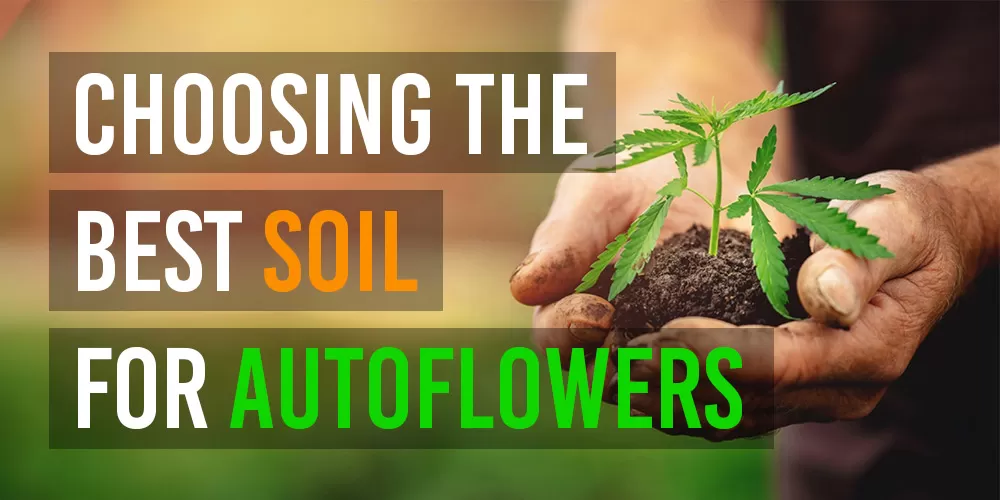


Table of Contents
ToggleBefore we dive into the specifics, it’s essential to understand why soil selection is critical for autoflowers. Soil serves as the foundation for your plants, providing essential nutrients, a stable root environment, and a medium for water and oxygen exchange.
When selecting soil for your autoflowers, several factors come into play. Let’s explore each of these factors in greater detail to help you make an informed decision.
1. Nutrient Composition
The nutrient composition of your soil is vital for the healthy growth of autoflowers. Soil rich in essential macronutrients such as nitrogen, phosphorus, and potassium is a must. Additionally, micronutrients like iron, copper, and zinc play a crucial role. We’ll discuss the ideal nutrient ratio and the significance of macronutrients and micronutrients in promoting robust plant development.
2. Soil Texture
The texture of your soil affects water retention, aeration, and root development. For autoflowers, a well-draining soil is essential to prevent overwatering and root rot. We’ll delve into the optimal soil textures, including sandy loam and coco coir, which facilitate proper moisture levels and oxygen circulation.
3. pH Levels
Maintaining the right pH level is crucial for nutrient uptake. Different nutrients become available to plants at different pH ranges. For autoflowers, the ideal pH range is typically between 6.0 and 6.8. We’ll explain how to measure and adjust pH levels to create an optimal growing environment.
4. Organic vs. Synthetic Soil
Should you opt for organic or synthetic soil? Each has its advantages and disadvantages. Organic soil promotes a more natural and sustainable approach, while synthetic soil offers precise nutrient control. We’ll explore the pros and cons of each to help you decide which suits your gardening style and goals.
Now that we’ve covered the essential factors to consider let’s take a closer look at the best soil options for autoflowers, providing more in-depth information on each.
1. Super Soil Mix
Super soil is a popular choice among experienced growers due to its rich nutrient content. It’s essentially a pre-amended soil mix that provides all the necessary nutrients for the entire grow cycle. We’ll not only explain how to create your own super soil mix but also recommend some pre-made options for convenience.
Key Features of Super Soil:
Nutrient-Rich: Super soil is loaded with essential macronutrients and micronutrients, eliminating the need for frequent fertilization.
Living Soil: It fosters a living soil environment where beneficial microorganisms thrive, aiding in nutrient absorption.
Organic Ingredients: Typically composed of organic materials such as compost, earthworm castings, bone meal, and bat guano.
Minimal Maintenance: Super soil requires less maintenance and monitoring compared to other soil types, making it a favorite among growers.
2. Coco Coir
Coco coir is known for its excellent water retention and aeration properties. It’s derived from coconut husks and is a sustainable alternative to peat moss. We’ll explore its unique qualities, how to prepare it for planting, and why it’s an excellent choice for autoflowers.
Key Features of Coco Coir:
Water Retention: Coco coir can hold water exceptionally well, ensuring consistent moisture levels for your plants.
Aeration: It provides excellent aeration to the root zone, preventing the risk of overwatering and root suffocation.
pH Neutral: Coco coir is naturally pH neutral, which allows for greater control over your growing environment.
3. Organic Potting Mix
Organic potting mixes provide a natural and sustainable option for cultivating autoflowers. These mixes typically contain organic materials such as compost, peat moss, and perlite. We’ll delve into some top-rated organic potting mixes on the market, highlighting their benefits and applications.
Key Features of Organic Potting Mix:
Nutrient-Rich: Organic potting mixes are often enriched with organic nutrients that release slowly over time, promoting steady plant growth.
Sustainability: They are composed of renewable and environmentally friendly components.
Microbial Activity: Organic potting mixes encourage beneficial microbial activity in the soil, promoting nutrient availability to your plants.
1. Properly Preparing Your Soil
To ensure your chosen soil is ready for autoflower cultivation, we’ll provide a detailed step-by-step guide on soil preparation. This includes tasks like pH adjustment, nutrient supplementation, and proper mixing techniques to create the best possible environment for your plants.
2. Nutrient Supplements
While some soils come pre-loaded with nutrients, others may require supplementation during the growing cycle. We’ll discuss the various nutrient supplements and additives available, explaining when and how to use them to enhance your soil’s performance and ensure your autoflowers receive the nutrients they need.
3. Pest and Disease Prevention
Keeping pests and diseases at bay is essential for a thriving autoflower garden. We’ll provide an extensive section on organic methods to protect your plants, including companion planting, neem oil treatments, and beneficial insect releases. By following these strategies, you can minimize the risk of common cannabis pests and diseases.
In conclusion, the best soil for autoflowers is a crucial element in achieving a bountiful harvest. By considering factors like nutrient composition, soil texture, pH levels, and the type of soil, you can create an ideal environment for your autoflowering cannabis plants to thrive.
Get started on your autoflowering cannabis journey today by choosing the right soil that suits your needs. Happy gardening!
What is the best soil pH for autoflowers?
The ideal pH range for autoflowers is typically between 6.0 and 6.8. This range allows for optimal nutrient uptake.
Can I reuse soil for autoflowers in subsequent grows?
Yes, you can reuse soil for autoflowers with proper preparation and nutrient replenishment. However, it’s essential to monitor soil health and fertility.
Is it better to grow autoflowers in containers or directly in the ground?
Growing autoflowers in containers provides more control over soil quality and allows for mobility. In contrast, planting directly in the ground may require additional soil amendments.
What are the common signs of nutrient deficiencies in autoflowers
Common signs of nutrient deficiencies in autoflowers include yellowing leaves, stunted growth, and poor bud development. Conduct regular inspections to address these issues promptly.
How often should I water my autoflowers when using different soil types?
The frequency of watering depends on the soil type, humidity levels, and plant size. It’s crucial to monitor soil moisture and adjust your watering schedule accordingly.


Best Selling
Feminized Seeds
Regular Seeds
Customer Help
WE SELL MARIJUANA SEEDS IN THE USA

Are You 18 Or Over?
YesOr
No By clicking yes, you certify that you are over 18. By using this website, you agree to our legal disclaimer.